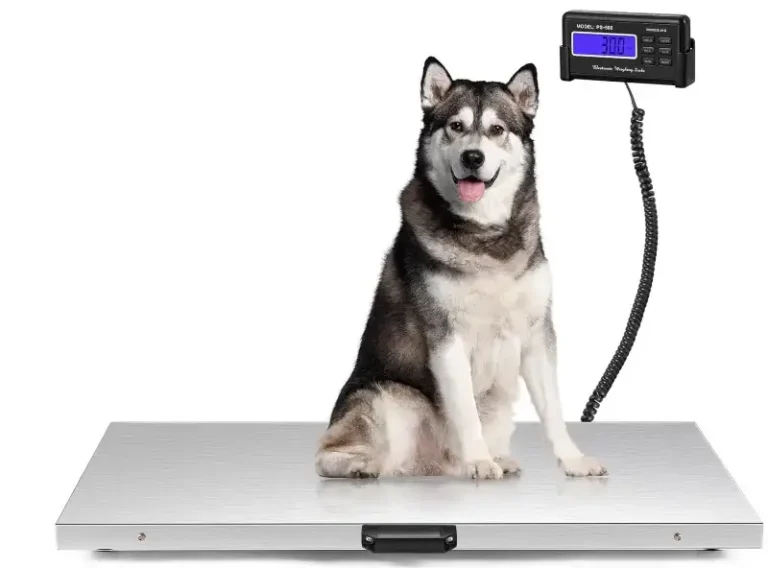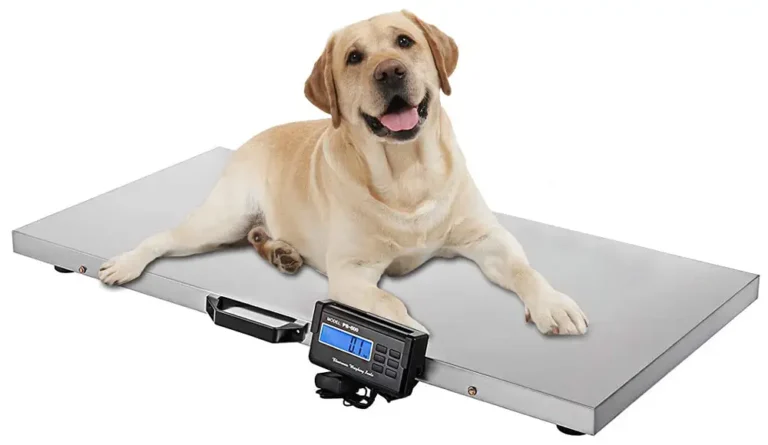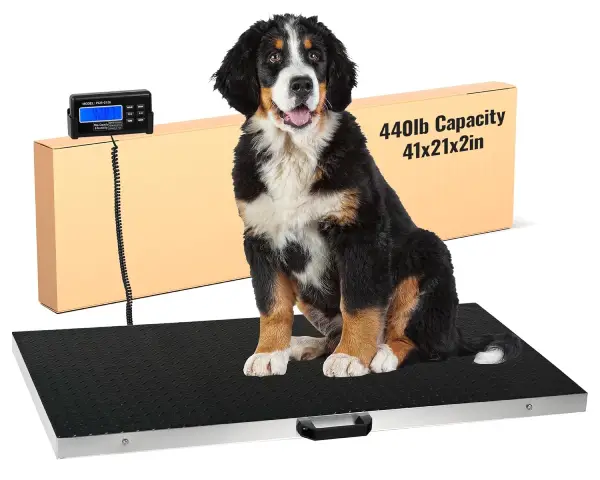Large Pet Scales
Understanding Large Pet Scales
Large pet scales are specialized weighing devices designed to accurately measure the weight of bigger animals, such as dogs and other heavier pets. These scales play a critical role in veterinary assessments and pet health management, offering precise weight measurements that are essential for monitoring an animal’s health condition. Unlike standard pet scales that may only accommodate smaller animals, large dog scales are built with robust structures and larger platforms to ensure stability and safety for heavier pets.
Best Pet Scales for Large Dogs
Various types of large pet scales are available on the market, each catering to different needs. For instance, mechanical large animal scales operate without a power source, making them reliable and easy to use in various settings. On the other hand, digital large pet scales provide enhanced features, such as memory functions and the ability to display weight in different units, including pounds and kilograms. Some scales even offer advanced functions like automatic hold, ensuring that the pet weight is recorded even if the animal moves while being weighed.
The significance of accurate weight measurement cannot be overstated in pet care. Regularly checking a pet’s weight helps in the early detection of potential health issues, such as obesity or malnutrition, which can lead to serious complications if left unchecked. Moreover, an accurate weight reading is essential when prescribing medication, as dosages often rely on the precise weight of the animal. By investing in a reliable large pet scale, pet owners and veterinarians can ensure that dogs and heavier animals receive appropriate care, thereby improving their overall health and wellbeing.
Large Pet Scales
Bonvoisin Pet Scale for Large Dogs
1100LB Large Dog Scale
Houseables Large Dog Scale
Key Features of Large Pet Scales
When selecting a large pet scale for your canine companion or other heavier animals, there are several key features that one must consider to ensure safety and accuracy. One essential aspect is the low-profile design of the scale. This design simplifies the loading process for larger pets, reducing the risk of injury associated with jumping or climbing onto a high platform. A pet scale with a low profile allows pets to access it more easily, making the weighing process smoother for both the owner and the animal.
Another crucial feature is the presence of a non-slip surface on the scale. Pets, especially larger breeds, may become anxious or unstable when being weighed. A non-slip surface provides additional security and comfort, minimizing the likelihood of slips or falls during the weighing process. This is particularly important for large dog scales designed for heavier animals whose weight can create a greater risk if they lose their footing.
The weight capacity of the large pet scale is also a significant consideration. Selecting a scale that accommodates the weight of your pet is vital to obtaining accurate readings. Scales with a higher weight capacity are not only beneficial for measuring larger dogs but can also serve a broader range of animals, making them versatile choices for pet owners with multiple types of pets or for veterinary practices.
Furthermore, additional features such as ramps or handrails can enhance the functionality of a large pet scale. Ramps assist animals that may have mobility issues, allowing them to access the scale with less strain. Handrails can provide extra support, ensuring pets feel safe and secure during weighing, leading to a more positive experience overall. Paying attention to these key features will ensure that you select the right animal scale for your pet’s needs.
Benefits of Using Large Pet Scales
The utilization of large pet scales presents numerous advantages for pet owners, especially for those with large dogs and heavier animals. One of the primary benefits is the capacity to monitor your pet’s weight routinely, which aids in the prevention of obesity. Regular weight checks enable owners to identify any unusual weight gain or loss, allowing for timely interventions, whether that involves dietary changes or increased physical activities.
Moreover, large dog scales play a significant role in the management of ongoing health conditions. For pets suffering from chronic diseases such as diabetes or arthritis, maintaining a specific weight range can be crucial for effective treatment. By using an animal scale regularly, owners can track their pet’s weight fluctuations, which can considerably enhance the efficacy of their veterinary care. This proactive approach allows for adjustments in medication or treatment plans based on precise weight measurements, ensuring that the pet receives optimal care.
Additionally, large pet scales are invaluable during veterinary visits. Having an accurate weight measurement is often essential for diagnosing health issues and determining proper dosages for medications. An animal scale that can comfortably accommodate larger pets ensures that veterinarians receive reliable data, which can lead to improved treatment outcomes. This device also facilitates better pet management overall, as regular weight checks provide a holistic view of the animal’s health trends over time.
In essence, the integration of large pet scales into routine pet care not only contributes to the physical health of larger animals but also empowers pet owners with the knowledge needed to make informed decisions regarding their pet’s wellbeing.
Choosing the Right Large Pet Scale for Your Needs
When it comes to selecting the right large pet scale for your canine companion or heavier animals, there are a number of factors to consider. The first aspect to evaluate is the size and weight capacity of the scale. Ensure that the scale can accommodate the weight of your pet, especially if you own a large dog or another hefty animal. A reliable large dog scale should support weights well above your pet’s estimated weight to guarantee accurate readings.
Another important factor is the design and ease of use of the animal scale. Look for a model that features a slip-resistant surface, making it easier for your pet to step onto the scale without any fear of slipping. Additionally, a low-profile design can facilitate easier access for larger pets, ensuring they feel comfortable while being weighed. Consider a scale that incorporates features like a hold function, which allows the scale to lock the weight reading, making it particularly useful for pets that are not willing to stay still.
Portability and storage options are also essential. If you plan to use the scale in different locations, such as at home and the veterinarian’s office, a lightweight and portable model would be ideal. Similarly, consider a design that can be easily disassembled or stored when not in use. Durability is another key factor; opt for scales that are made with sturdy materials that can withstand regular use, especially important for heavier pets.
Lastly, budget considerations can’t be overlooked. Large pet scales are available at various price points, so define what features are most important to you and identify a scale that fits your financial constraints while still meeting your pet’s needs. By evaluating these aspects diligently, you can make an informed decision and choose a large pet scale that serves both you and your beloved pet effectively.



